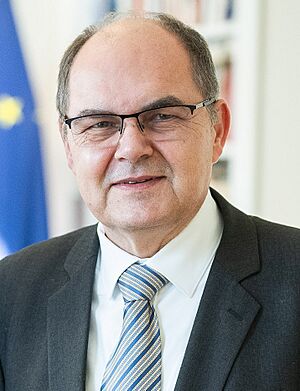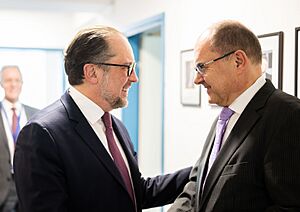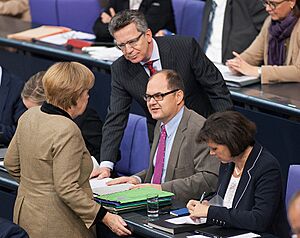Christian Schmidt (politician) facts for kids
Quick facts for kids
Christian Schmidt
|
|||||||||||||
|---|---|---|---|---|---|---|---|---|---|---|---|---|---|

Schmidt in 2024
|
|||||||||||||
| High Representative for Bosnia and Herzegovina | |||||||||||||
| Assumed office 1 August 2021 |
|||||||||||||
| Preceded by | Valentin Inzko | ||||||||||||
| Minister of Transport and Digital Infrastructure | |||||||||||||
|
Interim
|
|||||||||||||
| In office 24 October 2017 – 14 March 2018 |
|||||||||||||
| Chancellor | Angela Merkel | ||||||||||||
| Preceded by | Alexander Dobrindt | ||||||||||||
| Succeeded by | Andreas Scheuer | ||||||||||||
| Minister of Food and Agriculture | |||||||||||||
| In office 17 February 2014 – 14 March 2018 |
|||||||||||||
| Chancellor | Angela Merkel | ||||||||||||
| Preceded by | Hans-Peter Friedrich | ||||||||||||
| Succeeded by | Julia Klöckner | ||||||||||||
| Parliamentary State Secretary in the Ministry for Economic Cooperation and Development |
|||||||||||||
| In office 17 December 2013 – 17 February 2014 |
|||||||||||||
| Minister | Gerd Müller | ||||||||||||
| Preceded by | Gudrun Kopp | ||||||||||||
| Succeeded by | Thomas Silberhorn | ||||||||||||
| Parliamentary State Secretary in the Ministry of Defence |
|||||||||||||
| In office 23 November 2005 – 17 December 2013 |
|||||||||||||
| Minister | Franz Josef Jung Karl-Theodor zu Guttenberg Thomas de Maizière |
||||||||||||
| Preceded by | Walter Kolbow | ||||||||||||
| Succeeded by | Ralf Brauksiepe | ||||||||||||
|
|||||||||||||
| Personal details | |||||||||||||
| Born | 26 August 1957 Obernzenn, Bavaria, West Germany |
||||||||||||
| Political party | Christian Social Union | ||||||||||||
| Spouse |
Ria Hess
(m. 1989) |
||||||||||||
| Children | 2 | ||||||||||||
| Alma mater | University of Erlangen | ||||||||||||
| Profession | Lawyer | ||||||||||||
Hans Christian Friedrich Schmidt (born 26 August 1957) is a German politician. Since August 2021, he has been the High Representative for Bosnia and Herzegovina. This important role helps guide the country towards peace and stability. He is a member of the Christian Social Union, a political party in Germany.
Before his current role, Schmidt held several important positions in the German government. From 2014 to 2018, he was the Minister of Food and Agriculture. He also served as a Parliamentary State Secretary in the German Federal Ministry of Defence and the German Federal Ministry for Economic Cooperation and Development. For many years, from 1990 to 2021, he was a member of the Bundestag, which is the German Parliament.
Contents
Christian Schmidt's Early Life and Education
Christian Schmidt grew up in Germany. He finished high school in 1976. After that, he joined the West German Army for his mandatory military service.
In 1977, he started studying law at universities in Erlangen, Germany, and Lausanne, Switzerland. He successfully completed his law studies in 1982 and 1985. After becoming a lawyer in 1985, he worked in law until he took on his first big government job in 2005.
Christian Schmidt's Political Journey
Christian Schmidt started his political journey early. In 1973, when he was a student, he joined the Junge Union (JU), which is the youth group of the CSU party. He officially became a member of the CSU party in 1976.
He held several leadership roles in the youth group and local politics. From 1984 to 1990, he was a town councilor in his hometown of Obernzenn. He also served on the District Council for Neustadt an der Aisch-Bad Windsheim.
Schmidt continued to rise in the CSU party. He became a member of the CSU State Committee and later became the Chairman of the CSU-District Association in Fuerth. He also led groups focused on foreign policy, security, and European affairs for his party.
Serving in the German Parliament (1990–2021)
Christian Schmidt was first elected to the Bundestag, the German Parliament, in 1990. For many years, he focused on foreign, defense, and European policies for his party. He was also the main spokesperson for defense policy for the CDU/CSU group in Parliament.
He worked to build good relationships with other countries. He chaired the German-Israeli Parliamentary Friendship Group and the German-British Parliamentary Friendship Group. He also helped with important agreements, like the German-Polish “Good Neighbour” Treaty in 1991.
Schmidt was elected to the Parliament directly from his home area of Fürth. He was nominated seven times as the CSU candidate for federal elections, showing strong support from his party.
Working in the Ministry of Defence (2005–2013)

In 2005, Chancellor Angela Merkel appointed Christian Schmidt as a Parliamentary State Secretary in the Federal Ministry of Defence. In this role, he was a key political representative for three different Defence Ministers.
During his time, he helped create a foundation to support soldiers affected by radar signals. He also played a big part in setting up the “Hardship Fund” in 2012. This fund gives extra help to soldiers who were seriously injured while serving their country, beyond what standard laws provide.
After the 2013 federal elections, Schmidt was part of the team that helped form a new coalition government. He focused on foreign affairs, defense, and development cooperation.
From 2011 to 2017, Schmidt was one of the five deputy chairmen of the CSU party. He was responsible for the party's views on foreign, security, and European policy. He also worked on building relationships between the CSU and other Christian Democratic parties in Europe, as well as with countries like Israel, the United States, and the United Kingdom.
Minister of Food and Agriculture (2014–2018)

From 2014 to 2018, Christian Schmidt served as the Federal Minister of Food and Agriculture under Chancellor Angela Merkel.
During his time as minister, he helped farmers during difficult times. For example, when milk prices dropped in 2016, he introduced an emergency plan of at least €100 million to help dairy farmers. This plan included loans and tax relief. His ministry also worked to control bird flu outbreaks, which involved culling many farm birds between 2016 and 2017.
In 2017, there was a discussion about extending the use of glyphosate, a chemical used in farming. Schmidt voted in favor of the extension in the European Union. This decision caused some debate because it went against an earlier agreement among German ministers.
Later Career Steps
After leaving his government minister role, Schmidt continued to be active in politics. He served on the Committee on Foreign Affairs and a special Sub-Committee on the United Nations.
In 2019, he was chosen to be part of a committee that planned the 30th anniversary of German reunification, a very important event in German history.
In June 2021, Christian Schmidt announced that he would not run in the 2021 federal elections. This meant he would step down from active German politics at the end of that parliamentary term.
High Representative for Bosnia and Herzegovina (2021–Present)

In January 2021, the German government suggested Christian Schmidt for the role of High Representative for Bosnia and Herzegovina. This is an international position that helps ensure peace and stability in Bosnia and Herzegovina, especially after the conflicts in the 1990s.
On 1 August 2021, he officially became the new High Representative, taking over from Valentin Inzko.
In November 2021, Schmidt reported to the United Nations secretary-general. He warned that Bosnia and Herzegovina was facing challenges and that international support might be needed to maintain peace.
After the 2022 general election in Bosnia and Herzegovina, Schmidt made some changes to the country's election laws. These changes included expanding the Federal House of Peoples and adjusting how its members are chosen. Some groups disagreed with these changes, while others, like the United States and United Kingdom embassies, supported them.
Discussions About His Role as High Representative

Some countries, like Russia and China, have expressed concerns about Christian Schmidt's appointment as High Representative. They believe he was not chosen in the usual way, which involved a broader agreement among international bodies. Because of this, they do not officially recognize his authority in the same way.
Within Bosnia and Herzegovina, some political leaders also disagree with Schmidt's decisions or his authority.
In April 2023, Schmidt took action to help form a new government in the Federation of Bosnia and Herzegovina after a long political delay. He temporarily suspended part of the Constitution to allow a new Prime Minister to be appointed. This action led to further debate among political parties.
In June 2023, the National Assembly of Republika Srpska voted to stop following some rulings by the Constitutional Court and to stop publishing the High Representative's decisions. Schmidt responded by saying that these actions went against the country's constitution and the Dayton peace agreement, which is the peace treaty for Bosnia and Herzegovina. He then canceled the laws that the Assembly had adopted.
In March 2024, Schmidt introduced new changes to Bosnia and Herzegovina’s election law. These changes included using electronic vote-counting and digital voting stations in some places as a test. A Bosnian Serb leader, Milorad Dodik, said that Serbs would block the work of the national government unless these new election laws were removed.
Christian Schmidt's Political Views
In August 2012, Christian Schmidt was one of many German lawmakers who signed a letter to the Russian ambassador. The letter expressed concern about the trial of three members of the group ... Riot. The lawmakers felt that holding them in detention for a long time and threatening them with severe punishment was too harsh. They believed that peaceful artistic acts, even if they are meant to be provocative, should not lead to serious criminal charges and long prison sentences in a country that allows different views.
Other Activities and Roles
Christian Schmidt has been involved in many organizations outside of his direct government roles:
- He is a member of the Supervisory Board for Deutsche Bahn, a major German railway company.
- He was also on the Supervisory Board for KfW, a German state-owned development bank, and Landwirtschaftliche Rentenbank, an agricultural bank.
- He is a trustee for the Leo Baeck Foundation.
- He is the President of the German Atlantic Society.
- He co-chairs the Society for Christian-Jewish Cooperation.
- He is involved with groups that promote dialogue between Germany and the Czech Republic.
- He is a member of the Advisory Board for the American Jewish Committee in Berlin.
- He is the Deputy Chairman of the Board for the Hanns Seidel Foundation.
Awards and Recognition
Christian Schmidt has received several awards for his work:
- 2004 – Commander of the Order of Three Stars for the Republic of Latvia
- 2005 – Commander for the Order of Merit for the Republic of Lithuania
- 2005 – Cross of the Order of Merit for the Federal Republic of Germany
- 2007 – Bavarian Distinguished Service Award
- 2012 – Honourable Accolade of the First Degree for National Defence, Hungary
- 2013 – Order of Ante Starčević, Croatia
See also
In Spanish: Christian Schmidt para niños
 | James Van Der Zee |
 | Alma Thomas |
 | Ellis Wilson |
 | Margaret Taylor-Burroughs |


